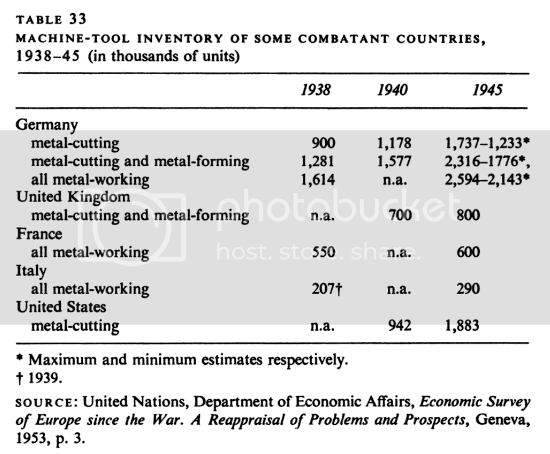Oh, really? Can you explain the things Tooze has retreated from and why Glantz is a bit distrustful of the idea of Soviet victory being inevitable?
The whole underlying point of
Wages of Destruction was that Germany was fundamentally inferior in economics, which represents the third school of Post-War consideration of the German war economy. The problem with that,
and Tooze has publicly stated his thesis needs revision on at least some points too, is what he's found since that book came out almost 20 years ago.
Case in point:
For the period after 1935, until the early 1940s, our data suggest a remarkable degree of convergence. The American stock stagnated. In some areas, there was disinvestment. And the average age of machinery rose dramatically. By contrast, Germany entered a period of rapid catch-up, which appears to have continued into the early years of the war. By 1940, German metal-working came close to matching its American counterpart in terms of the number of workers employed and the quantity and types of machines installed. German machines were, on average, far younger. This process of catching-up, however, was dramatically reversed during World War II. Over a period of no more than four years the American stock expanded by over eighty percent and growth was markedly concentrated in key categories of mass production equipment. It appears that it was only in this period that mass production machinery came to truly dominate US metal-working. German investment, albeit moving in the same direction, failed to match the new intensity of American commitment to mass production in some key machinery classes.
This was not a new revelation, really, and was something the old "Blitzkrieg School" had been arguing since the War ended:
If Germany has parity in industrial stock, how exactly can you make the claim they're inferior? You really can't,
which is something critiques of WoD have been saying since it came out:
However, there are also blanks in Tooze's study, which in a sense could not be avoided because the relevant research on this topic only got underway at the time his manuscript was written. Among these blank spots on the Nazi economy is, firstly, the historical analysis of its Europe-wide spread. In this respect, the author could only refer to individual country studies, especially on Franco German and German-Norwegian economic relations and the predatory economic side of the German invasion of the Soviet Union. However, comprehensive studies have only appeared in recent years. They make it clear that the archipelago of Nazi economics did indeed spread throughout Europe from 1940/41 onward, thereby countries that had remained formally neutral - in particular Switzerland and Sweden. In the territories occupied by Germany, a total of about 36 million people were forced to work for their war and armament efforts, almost three times more than the total of 13.5 million forced and slave laborers within the territory of the Reich. If Tooze were writing his study today, he could not get past these newly reconstructed facts and would have to change his assessment of the fundamental and, from the outset, hopeless inferiority of the Nazi economy to the potential of the Allies. In the light of these facts, on the other hand, the far more cautious assessment of Richard Overy's far more cautious assessment of the defeat of the fascist axis as far less "lawful" appears in a new light.2
As for David Glantz, look at his article
The Impact of Intelligence Provided to the Soviet Union by Richard Zorge on Soviet Force Deployments from the Far East to the West in 1941 and 1942,
The Journal of Slavic Military Studies from 2017 as an illustrative example of this:
Finally, the actions Stalin took in reaction to the intelligence he received had a major impact on the course and outcome of military actions during the first year of the Soviet-German War. Although they did not lessen the disastrous immediate impact the Barbarossa invasion had on the Soviet Armed Forces, that is the outright destruction of three armies and much of the Red Air Force on the ground, Stalin’s actions, which covertly deployed more than four reserve armies to the Smolensk region by early July, put paid to the German assumption it would win the war if it could destroy the bulk of the Red Army west of the Dvina and Dnepr Rivers. Likewise, Stalin’s decision in October 1941 to transfer large forces from the Far East to the West had a significant impact on the course and outcome of the battle for Moscow. In short, this decision ultimately played a major role in staving off a Red Army defeat at the gates of Moscow and helped prevent German seizure of the Soviet capital, if not the collapse of the Soviet Union as a whole. Furthermore, but to a lesser extent, it also facilitated the subsequent successful Red Army counteroffensive.
If you want an Axis victory PoD, here is David Glantz himself giving it to you via Richard Zorge getting picked up by German or Japanese counter-intelligence:
Therefore, and ironically, although Zorge provided valuable and accurate intelligence to his masters in Moscow throughout 1941, given Stalin’s actions and proclivities, Zorge made his most important contribution prior to 22 June 1941. This is so because information from Zorge and others prompted the always distrustful dictator to take those prudent measures—specifically, the convert mobilization and subsequent massive large-scale exercise, which ultimately thwarted the ambitious aims of Operation Barbarossa. While Zorge’s contributions after Barbarossa began, specifically during Operation Typhoon, remain significant, they were less so in terms of impact because Stalin would have likely acted as he did without Zorge’s information.
If you'd like a copy of the article, I'd be happy to give it.


